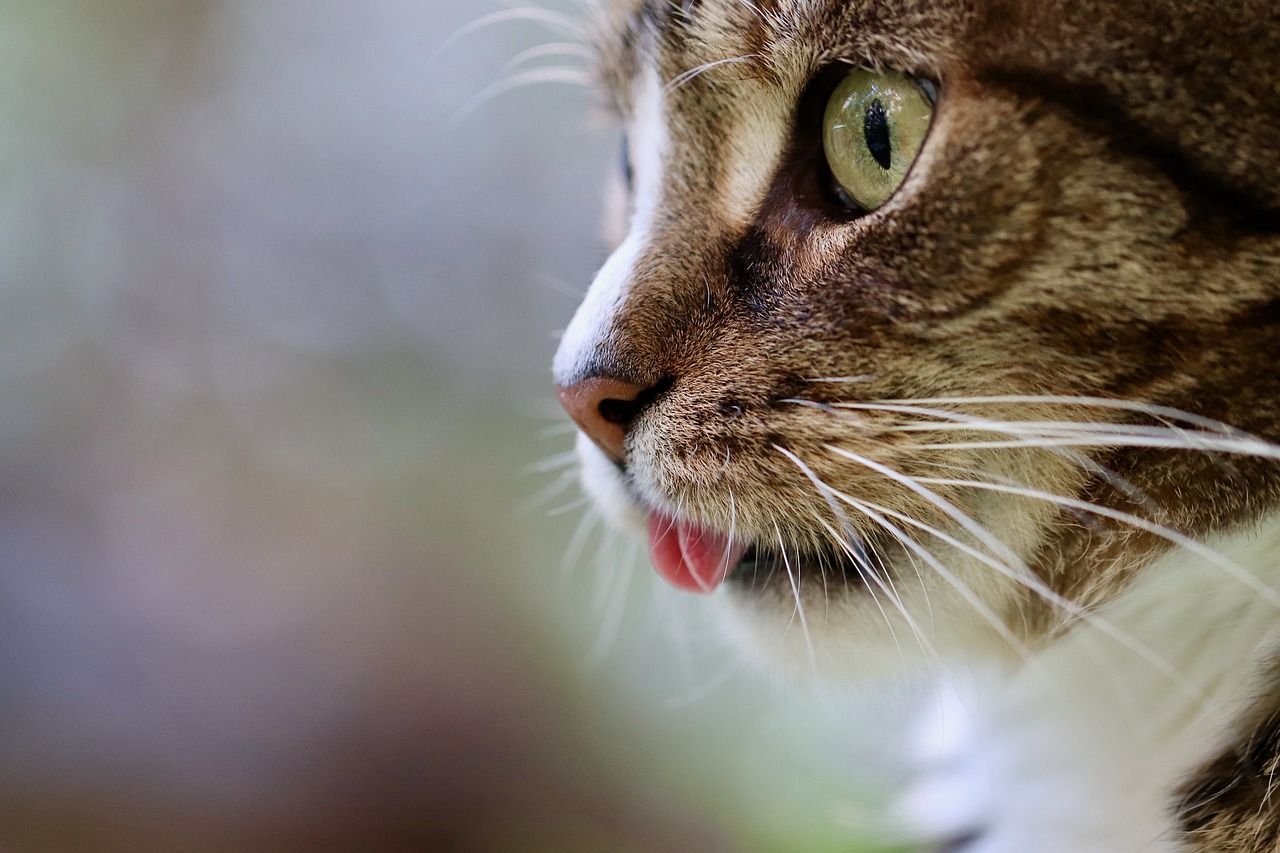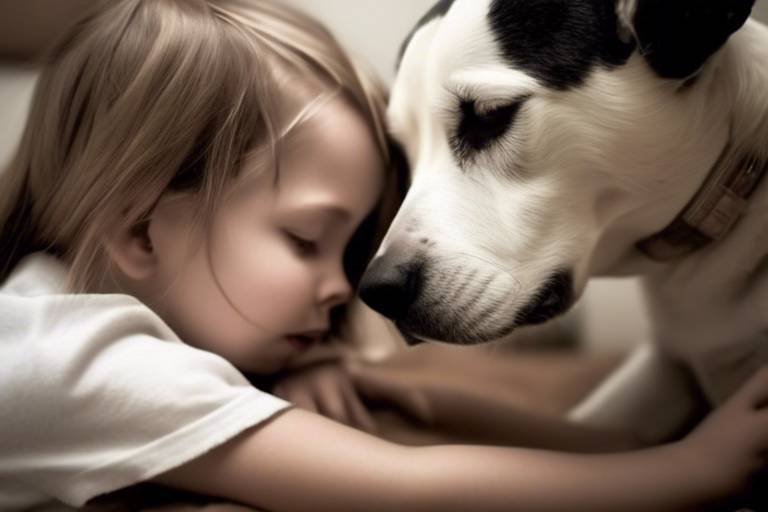The Benefits of Adopting a Rescue Cat
Adopting a rescue cat is not just about bringing home a furry friend; it's about opening your heart and home to a companion who has faced challenges and is ready to share unconditional love. Imagine the joy of watching a once-timid cat blossom into a playful, affectionate member of your family. The benefits of adopting a rescue cat extend far beyond companionship; they include significant mental health improvements, the noble act of saving lives, and the joy of enriching your home environment. Each cat has its own unique story, and by choosing to adopt, you become part of that story, creating a bond that can transform both your life and theirs.
Have you ever felt overwhelmed by the stresses of daily life? Adopting a rescue cat can be a game-changer! These furry companions are known for their ability to reduce stress and combat feelings of loneliness. When you bring a cat into your home, you gain a loyal friend who is always there to curl up next to you after a long day. Their playful antics can bring laughter and joy into your life, while their soothing purrs can create a calming atmosphere. Studies have shown that interacting with pets can decrease levels of cortisol, the stress hormone, and increase serotonin, the happiness hormone. So, if you're looking for a natural way to boost your mood, consider adopting a rescue cat!
By choosing to adopt a rescue cat, you're making a conscious decision to save a life. Shelters are often overwhelmed with animals in need of loving homes, and every adoption counts. When you adopt, you not only give a cat a second chance at life, but you also help reduce the number of homeless animals on the streets. It's a win-win situation! Your decision to adopt contributes to a more humane society, where every animal has the opportunity to find a loving family. Think about it: your choice can make a difference in the life of a cat who has been waiting for someone like you to come along.
To fully appreciate the impact of your adoption, it's essential to understand how shelters operate. Many shelters face challenges such as limited space and funding, which can make it difficult to care for all the animals in their care. By adopting a rescue cat, you support these organizations in their mission to provide shelter, food, and medical care for animals in need. Your adoption creates space for more rescues, allowing shelters to continue their vital work. It's a ripple effect of kindness that benefits the entire community.
Foster homes play a pivotal role in preparing rescue cats for adoption. These temporary homes provide a loving environment where cats can adjust to life outside of a shelter. Foster families help socialize cats, making them more adoptable and ready for their forever homes. They often share their experiences with potential adopters, providing valuable insights into the cat's personality and needs. By adopting a cat that has been in a foster home, you're likely to find a pet that is well-adjusted and ready for a loving family.
When you adopt a rescue cat, you're not just bringing a pet into your home; you're also engaging with your community. Volunteering at local shelters or participating in adoption events can strengthen community bonds and raise awareness about the importance of animal welfare. By sharing your adoption experience, you inspire others to consider rescue options, creating a network of compassionate individuals dedicated to improving the lives of animals in need.
Rescue cats can also be fantastic additions to family life. They teach children about responsibility, empathy, and the importance of caring for another living being. The shared experiences of caring for a pet can create lasting memories and strengthen family bonds. Imagine the laughter and joy as your kids play with their new feline friend, or the comfort of snuggling together on the couch during a movie night. A rescue cat can truly transform your household into a loving, nurturing environment.
Another significant advantage of adopting a rescue cat is the cost-effectiveness. Adoption fees are typically much lower than purchasing from breeders, and they often include essential services like vaccinations, spaying/neutering, and initial health checks. This means that not only are you saving a life, but you're also making a financially sensible choice. It's like getting a great deal on a luxury item—you're receiving so much more than what you pay for!
While the initial adoption fee is generally lower, adopting a rescue cat can lead to long-term savings. Many rescue cats come from challenging backgrounds, which means they may have already received necessary medical care. This can lead to fewer unexpected veterinary costs in the future. By investing in a rescue cat, you're not just saving money; you're also investing in a loving companion who brings joy and happiness into your life.
Many shelters also provide essential supplies at reduced prices or include them in the adoption package. This can help new pet owners save money on initial costs, making the transition to cat ownership smoother. From litter boxes to food and toys, many of the basics can be covered, allowing you to focus on what really matters—building a bond with your new furry friend.
One of the most delightful aspects of adopting a rescue cat is the opportunity to discover unique personalities. Each cat comes with its own quirks and traits shaped by its past experiences. Some may be shy and need extra love, while others might be outgoing and playful. Understanding these traits can help you find a cat that perfectly fits your lifestyle and preferences. It's like finding a puzzle piece that completes your picture—when you adopt, you get to choose a companion that resonates with you.
1. How do I choose the right rescue cat for me?
Consider your lifestyle, living situation, and the amount of time you can dedicate to a pet. Spend time with different cats to find one whose personality matches yours.
2. Are rescue cats more prone to health issues?
Not necessarily. While some rescue cats may have had health issues in the past, many are healthy and have already received necessary medical care. Regular veterinary check-ups are essential for all pets.
3. What should I expect during the adoption process?
The adoption process typically involves filling out an application, meeting the cat, and sometimes a home visit. Shelters want to ensure a good match between you and the cat.
4. Can I adopt a rescue cat if I have other pets?
Yes! Many shelters encourage potential adopters to bring their existing pets for a meet-and-greet to ensure everyone gets along.
5. What if I can’t adopt right now?
You can still help by volunteering at shelters, fostering cats, or donating supplies. Every little bit helps!

Improved Mental Health
Adopting a rescue cat can significantly enhance your mental well-being by providing companionship, reducing stress, and alleviating feelings of loneliness. Imagine coming home after a long day, and there’s your furry friend, eagerly waiting to greet you with a purr and a nuzzle. That simple moment can transform your entire mood. Cats have a unique ability to sense our emotions, often curling up next to us when we need comfort the most.
The playful and affectionate nature of these rescue cats fosters emotional connections that can lead to greater happiness. Studies have shown that interacting with pets can release oxytocin, the “feel-good” hormone, which promotes feelings of love and bonding. This is particularly beneficial for individuals who may struggle with anxiety or depression. Just think of it as having a built-in therapist who doesn’t charge by the hour!
Moreover, the responsibility of caring for a cat can instill a sense of purpose. When you adopt a rescue cat, you are not just gaining a pet; you are welcoming a new member into your family. This relationship can create a routine that encourages you to get out of bed, engage in daily activities, and maintain a healthy lifestyle. The act of caring for another living being can shift your focus away from your own stressors, providing a much-needed distraction.
Here are a few ways in which rescue cats can improve your mental health:
- Companionship: Cats provide loyal companionship, reducing feelings of isolation.
- Stress Relief: The act of petting a cat can lower cortisol levels, leading to reduced stress.
- Joy and Laughter: Their quirky behaviors and playful antics can bring laughter into your home.
- Mindfulness: Caring for a cat encourages you to be present and mindful, which can improve your overall mental state.
In addition to these benefits, having a rescue cat can also lead to a more active social life. Cats can be great conversation starters, whether you’re chatting with fellow cat lovers online or at the local park. Sharing stories about your cat can help you connect with others, expanding your social circle and providing additional support.
In conclusion, the mental health benefits of adopting a rescue cat are profound. From companionship to stress relief, these furry friends can significantly enhance your quality of life. So, if you’re considering a new pet, think about how a rescue cat could not only find a loving home but also bring joy and comfort to your life.
Q: How does having a cat help with anxiety?
A: Cats provide companionship and comfort, which can help alleviate feelings of anxiety. Their presence can be soothing, and petting a cat has been shown to lower stress levels.
Q: Can adopting a cat really improve my mood?
A: Absolutely! The bond you form with a cat can lead to increased happiness and reduced feelings of loneliness, thanks to the emotional support they provide.
Q: What if I have allergies? Can I still adopt a cat?
A: There are hypoallergenic cat breeds that produce fewer allergens. It's best to consult with a veterinarian to find a suitable option for your situation.

Saving Lives
When you choose to adopt a rescue cat, you are not just bringing home a furry friend; you are making a profound difference in the life of an animal that desperately needs a second chance. Every year, millions of cats end up in shelters due to various reasons, including abandonment, neglect, or unforeseen circumstances faced by their previous owners. By adopting, you are directly contributing to the reduction of this heartbreaking statistic. Imagine being the reason a cat gets to experience love, warmth, and safety after a life spent in uncertainty. It’s like giving them a ticket to a whole new world!
In addition to saving individual lives, your decision to adopt plays a crucial role in promoting a more humane society. Shelters are often overwhelmed, and every adoption creates space for another cat in need. This ripple effect is incredibly significant. For instance, consider the following statistics:
| Year | Cats Adopted | Cats in Shelters |
|---|---|---|
| 2020 | 1,500,000 | 3,200,000 |
| 2021 | 1,700,000 | 2,800,000 |
| 2022 | 2,000,000 | 2,500,000 |
As you can see, with each passing year, the number of cats adopted increases, which is a positive trend. However, there are still many cats waiting for their forever homes. By adopting a rescue cat, you are not just saving one life; you are contributing to a larger movement that advocates for the well-being and humane treatment of all animals.
Furthermore, understanding the dynamics of shelters can help you appreciate the importance of your decision. Shelters are often filled to capacity, and the staff works tirelessly to care for the animals. By adopting, you support these efforts and enable shelters to continue their mission. It’s a win-win situation!
Many rescue cats have unique stories that make their journey to adoption even more poignant. Some may have been strays, while others might have been surrendered by their owners. Regardless of their past, they all share a common desire: to find a loving home. When you adopt a rescue cat, you are not only giving them a home but also offering them hope. You become a part of their story, a chapter filled with love and companionship.
So, if you’re considering adding a furry friend to your family, think about the impact you can have. You have the power to change a life forever. After all, every cat deserves a chance to be loved and cared for. Why not make that difference today?
- What is the adoption process like? The adoption process usually involves filling out an application, meeting the cat, and sometimes an interview with shelter staff to ensure a good match.
- Are rescue cats healthy? Most rescue cats are vaccinated, spayed/neutered, and checked for health issues before adoption.
- Can I adopt a rescue cat if I have other pets? Yes! Many shelters will help you assess whether a new cat will get along with your current pets.
Understanding Shelter Dynamics
When it comes to adopting a rescue cat, it's crucial to understand the intricate dynamics of animal shelters. These organizations are often overwhelmed with the number of animals they care for, and each cat has its own unique story. Shelters operate under the constant pressure of limited resources, which makes every adoption a lifeline for the animals waiting for their forever homes. When you adopt a cat from a shelter, you're not just gaining a pet; you're actively participating in a larger movement to combat animal homelessness.
Many shelters are run by dedicated staff and volunteers who pour their hearts into caring for these animals. However, they face numerous challenges, including:
- Overcrowding: Shelters can quickly become full, leading to difficult decisions about which animals can stay.
- Funding Constraints: Financial limitations can affect the quality of care and the resources available for each animal.
- Health Issues: Many rescue cats come with medical needs that require immediate attention, adding to the burden on shelters.
Understanding these challenges can deepen your appreciation for the work shelters do and the importance of your decision to adopt. By choosing to adopt rather than shop, you're helping to alleviate some of these pressures. Each adoption creates space for another animal in need, allowing shelters to continue their mission of rescuing and rehabilitating cats.
Moreover, fostering a cat before adoption is another way to contribute positively to the shelter dynamics. Foster homes provide a nurturing environment where cats can thrive, making them more adoptable. They receive love and socialization, which is vital for their emotional well-being and helps them adjust better to their new homes. This process not only benefits the cats but also assists shelters by freeing up space for more rescues.
In essence, understanding the dynamics of shelters and the challenges they face can empower you as a potential adopter. It highlights the significance of your choice and the impact it has on the lives of countless animals. So, the next time you consider bringing a furry friend into your home, remember that your decision can make a world of difference!
| Question | Answer |
|---|---|
| What should I consider before adopting a rescue cat? | Consider your lifestyle, the time you can dedicate to a pet, and any allergies or other pets in your home. |
| How do shelters determine which cats are adoptable? | Shelters assess each cat's health, behavior, and temperament to ensure they are ready for adoption. |
| Can I adopt a cat if I have kids? | Yes! Many cats are great with children, but it's essential to choose a cat that matches your family's energy and lifestyle. |
| What if I want to adopt but can't keep a cat long-term? | Consider fostering! It allows you to help a cat in need without the long-term commitment. |
The Role of Foster Homes
Foster homes are like the unsung heroes of the animal rescue world. They provide a temporary sanctuary for rescue cats, allowing these furry friends to experience a loving environment while they await their forever homes. Imagine being a cat in a shelter, surrounded by noise and uncertainty. Now, picture being whisked away to a cozy home filled with warmth, toys, and a caring human. That’s the magic of foster homes!
These homes play a crucial role in the rehabilitation process of rescue cats. By offering a safe and nurturing space, foster families help cats adapt to life outside the shelter. They can work on socializing the cats, teaching them essential skills, and even helping them overcome any trauma they may have experienced. For instance, a shy cat may blossom into a playful companion when given the time and care it needs in a foster home.
Moreover, foster homes allow potential adopters to see a cat’s true personality. In a shelter, a cat might be stressed or scared, hiding in a corner. But in a loving foster environment, they can showcase their unique traits, whether it's their quirky antics, affectionate nature, or playful spirit. This insight is invaluable for anyone considering adoption, as it helps ensure a perfect match between the cat and its future family.
Foster families also play a vital role in alleviating overcrowding in shelters. By temporarily taking in cats, they create space for more animals in need. This ripple effect not only saves lives but also supports the overall mission of shelters to care for and rehabilitate animals. In fact, many shelters rely heavily on their network of foster homes to manage their populations and ensure that every cat gets the attention and care it deserves.
Being a foster parent isn’t just about the cats; it’s also a rewarding experience for the humans involved. It teaches responsibility, compassion, and the joy of nurturing a creature in need. Plus, there’s nothing quite like the feeling of watching a once-timid cat transform into a confident, loving companion, ready to embark on a new adventure with their forever family.
- How long do cats typically stay in foster homes? The duration can vary greatly, from a few weeks to several months, depending on the cat's needs and the adoption process.
- Do I need to provide anything for the cat? Most shelters provide supplies like food, litter, and toys, but you may want to have some basics on hand, like a litter box and scratching post.
- Can I adopt a cat I foster? Yes! Many foster parents end up adopting the cats they foster, which can be a beautiful outcome.
- What if I can't keep the cat? If you find that fostering isn’t working for you, shelters are usually very understanding and will help you find a solution.
Community Involvement
Engaging with local shelters and fostering rescue cats can significantly strengthen community bonds. When you adopt a rescue cat, you're not just bringing a furry friend into your home; you're also becoming part of a larger movement that promotes animal welfare and compassion. Imagine walking into a shelter and feeling the warmth of the community around you, all working towards the common goal of saving lives. This collective effort creates a ripple effect, inspiring others to consider adopting rather than shopping for pets.
Volunteering at shelters is another fantastic way to get involved. Whether it’s helping with daily care, organizing fundraising events, or simply spreading the word about the importance of adoption, every little bit helps. These activities foster a sense of belonging and purpose, not just for the animals but for the volunteers as well. It’s a win-win situation! You get to meet like-minded individuals who share your passion and dedication to animal welfare.
Moreover, fostering cats can be a deeply rewarding experience. It allows you to provide a safe and loving environment for a cat in need while simultaneously preparing them for their forever home. This not only benefits the cats but also enriches your life as you witness their growth and transformation. You might even find yourself forming a bond with a foster cat, making it a bittersweet experience when it's time for them to go to their new families.
In addition to direct involvement, spreading awareness about the plight of rescue animals can also make a significant impact. Social media platforms are powerful tools for sharing stories and encouraging others to adopt. When you post about your rescue cat, you’re not just showcasing your pet; you’re also educating your friends and followers about the joys of adoption. This could lead to more people considering rescue options, ultimately saving more lives.
In summary, community involvement in animal rescue is a fulfilling journey that benefits everyone involved—animals, volunteers, and the community as a whole. By adopting, fostering, or volunteering, you contribute to a brighter future for countless cats and help create a society that values compassion and kindness. So, why not take that first step today? Your local shelter is waiting for you!
- What should I consider before adopting a rescue cat? Before adopting, consider your lifestyle, the time you can dedicate to a pet, and any allergies family members may have. It's essential to find a cat that fits well with your home environment.
- How can I get involved with my local shelter? You can volunteer, foster animals, or participate in fundraising events. Contact your local shelter for specific opportunities available in your area.
- What are the benefits of fostering rescue cats? Fostering helps prepare cats for adoption, provides them with a loving environment, and can be a rewarding experience for you as you help them transition to their forever homes.
- How can I spread awareness about animal adoption? Use social media to share your experiences, participate in community events, and talk to friends and family about the importance of adopting rescue animals.
Benefits for Families
Bringing a rescue cat into your home can be one of the most rewarding decisions you ever make for your family. These furry companions are not just pets; they become integral parts of your household, fostering bonds that can last a lifetime. Imagine the joy of watching your children learn responsibility as they help care for their new feline friend. Cats are naturally curious and playful, providing endless entertainment that can create cherished family memories. Whether it's a playful pounce or a cozy cuddle, the moments shared with a rescue cat can strengthen family ties in ways you might not expect.
Moreover, having a cat can also serve as a source of emotional support. Studies have shown that pets can alleviate stress and anxiety, making them perfect companions during tough times. When life gets overwhelming, curling up with a cat can bring a sense of calm and comfort. It's like having a little therapist at home who doesn’t judge and is always ready to listen. This emotional connection can be particularly beneficial for children, teaching them empathy and nurturing skills as they learn to care for another living being.
Additionally, adopting a rescue cat can spark important conversations about compassion and responsibility within the family. It offers a unique opportunity for parents to teach their kids about animal welfare, the importance of kindness, and the realities of pet ownership. Engaging in discussions about why adoption matters can instill values that last a lifetime. When children see the love and gratitude in a rescue cat's eyes, they learn firsthand the impact of their actions, fostering a sense of pride and accomplishment.
Involving the whole family in the adoption process can also be a fun and bonding experience. From visiting the shelter to choosing the right cat, every step can be a family adventure. It’s an opportunity to work together, making decisions that impact everyone. Plus, the excitement of bringing a new pet home can create a buzz that lifts everyone’s spirits. Just like planning a family vacation, adopting a cat can be an event filled with anticipation and joy.
Finally, let’s not forget the laughter and joy that a cat can bring into your home. Their quirky antics and playful behavior can lighten the mood and create a fun atmosphere. Whether they’re chasing a laser pointer or getting into a cardboard box, these moments are priceless. In essence, adopting a rescue cat isn’t just about adding a pet to your family; it’s about enriching your lives with love, laughter, and invaluable lessons.
- What should I consider before adopting a rescue cat? It's essential to evaluate your living situation, time availability, and whether your family is ready for the responsibilities that come with pet ownership.
- How can I prepare my home for a new cat? Make sure to cat-proof your home by removing hazards, providing a safe space, and gathering necessary supplies like litter boxes, food, and toys.
- Are rescue cats trained? Many rescue cats come with some level of training, but it's important to be patient and provide guidance as they adjust to their new home.
- What if my family has allergies? Some breeds are more hypoallergenic than others. It's best to spend time with cats before adopting to see how family members react.

Cost-Effectiveness
When it comes to adding a furry friend to your family, the financial implications can often weigh heavily on your mind. However, adopting a rescue cat is not just a heartwarming choice; it’s also a cost-effective one. Let’s break down the numbers and see how adopting a rescue cat can save you money while providing a loving companion.
First off, adoption fees at shelters are generally much lower than the prices charged by breeders. For instance, while a purebred cat can set you back anywhere from $500 to $3,000, most shelters charge a nominal fee ranging from $50 to $150. This fee typically covers essential services such as:
- Initial vaccinations
- Spaying or neutering
- Microchipping
- Basic health checks
Not only are you saving money upfront, but you’re also gaining peace of mind knowing that your new feline friend is healthy and ready for their new home. It's like getting a complete package deal!
Moreover, adopting a rescue cat can lead to significant long-term financial benefits. Many shelters ensure that their cats are in good health before adoption, which can help reduce unexpected veterinary costs down the line. Imagine the relief of not having to worry about hefty vet bills right after bringing your new pet home. Additionally, rescue cats are often more adaptable and resilient, which can mean fewer health issues compared to some breeds that are prone to genetic disorders.
Another cost-saving aspect is the availability of affordable supplies. Many shelters collaborate with local pet stores to offer discounts on essential items like litter, food, and toys. Some even include starter kits that come with all the necessities to get you started. This can be a game changer for new pet owners who might feel overwhelmed by the initial expenses.
| Expense Type | Adoption Cost | Breeder Cost |
|---|---|---|
| Initial Adoption Fee | $50 - $150 | $500 - $3,000 |
| Vaccinations & Health Checks | Included | Varies (up to $200) |
| Spaying/Neutering | Included | Varies (up to $300) |
In conclusion, adopting a rescue cat is not only a loving choice but also a financially savvy one. With lower initial costs, potential long-term savings, and access to affordable supplies, you’ll find that bringing a rescue cat into your home is a decision that benefits both your heart and your wallet. Why not take that leap and make a difference today?
Q: What is the average cost of adopting a rescue cat?
A: The average cost can range from $50 to $150, depending on the shelter and location.
Q: Are there any hidden costs associated with adopting a rescue cat?
A: Most shelters are transparent about their fees, but you should also budget for food, litter, toys, and potential veterinary care.
Q: Do rescue cats require more medical care than other cats?
A: Generally, rescue cats are screened for health issues before adoption, which can lead to fewer immediate medical expenses.
Q: Can I find supplies at a discount after adopting?
A: Yes! Many shelters partner with pet stores to offer discounts on supplies for new pet owners.
Long-Term Financial Benefits
When it comes to adopting a rescue cat, the initial adoption fee is just the tip of the iceberg regarding financial advantages. While some might think that purchasing a cat from a breeder is the way to go, they often overlook the hidden costs associated with such decisions. In contrast, adopting a rescue cat can lead to significant long-term savings that can make a big difference in your budget.
First off, let's talk about the adoption fee. Typically, this fee is relatively low compared to the price tags associated with purebred cats. Most shelters charge a nominal fee that covers essential services such as vaccinations, spaying or neutering, and even initial health checks. This means you’re not just adopting a pet; you’re getting a well-rounded companion ready to join your family without breaking the bank.
Moreover, rescue cats tend to be healthier overall. Many shelters conduct thorough health assessments before placing cats for adoption. As a result, you’re less likely to face unexpected veterinary bills shortly after bringing your new feline friend home. This proactive approach to healthcare can save you a ton of money in the long run. For instance, consider the following:
| Expense Type | Cost for Breeder Cat | Cost for Rescue Cat |
|---|---|---|
| Initial Adoption Fee | $500 - $2000 | $50 - $150 |
| Spay/Neuter | $200 - $500 | Included |
| Initial Vaccinations | $100 - $200 | Included |
| Health Checks | $50 - $150 | Included |
As you can see from the table above, the financial benefits of adopting a rescue cat become even clearer when you consider the comprehensive care that comes with the adoption fee. You’re not just saving money upfront; you’re also investing in a healthier future for your pet.
Additionally, many shelters offer discounted supplies or even include essential items in the adoption package. This can range from food and litter to toys and scratching posts, allowing new pet owners to save even more during the initial transition period. Imagine walking into a pet store and realizing you don’t need to buy half the stuff on your list because your shelter has you covered! That’s a win-win situation.
In conclusion, adopting a rescue cat isn't just a heartwarming choice; it's also a financially savvy one. By choosing to adopt, you’re not only saving a life but also making a decision that can lead to . So why not open your heart and home to a rescue cat? Your wallet will thank you!
- What is the average cost of adopting a rescue cat? The average adoption fee ranges from $50 to $150, which often includes vaccinations and spaying/neutering.
- Are rescue cats healthy? Yes, most rescue cats undergo health assessments and vaccinations before adoption, which helps ensure they are healthy companions.
- What supplies do I need for a rescue cat? Essential supplies include food, litter, a litter box, scratching posts, and toys. Many shelters provide starter kits that can help you save money.
Affordable Supplies
This article explores the numerous advantages of adopting rescue cats, including their positive impact on mental health, the importance of saving lives, and how they can enrich your home and family life.
Adopting a rescue cat can significantly enhance your mental well-being by providing companionship, reducing stress, and alleviating feelings of loneliness. Their playful and affectionate nature fosters emotional connections that can lead to greater happiness.
By choosing to adopt a rescue cat, you are directly contributing to the reduction of homeless animals. This decision helps save lives and promotes a more humane society by reducing the number of animals in shelters.
It’s essential to understand how shelters operate and the challenges they face. By adopting, you support shelters in their mission to care for animals in need while also creating space for more rescues.
Foster homes play a crucial role in preparing rescue cats for adoption. They provide a loving environment that helps cats adjust, making them more adoptable and ready for their forever homes.
Engaging with local shelters and fostering cats can strengthen community bonds. Volunteering or adopting raises awareness about the importance of animal welfare and encourages others to consider rescue options.
Rescue cats can bring families closer together. They teach responsibility to children, provide emotional support, and create lasting memories through shared experiences, making them an excellent addition to family life.
Adopting a rescue cat is often more affordable than purchasing from breeders. Adoption fees typically include vaccinations, spaying/neutering, and initial health checks, making it a financially sensible choice for pet owners.
While the initial adoption fee is lower, rescue cats can also lead to long-term savings. Their health and well-being may reduce future veterinary costs, making them a wise investment for your budget.
When you adopt a rescue cat, one of the pleasant surprises is the affordability of supplies. Many shelters understand that new pet owners might be on a budget, so they often provide essential supplies at reduced prices or include them in the adoption package. This can significantly ease the financial burden during your cat's transition into your home. Imagine walking out of the shelter with not just your new furry friend, but also a starter kit filled with goodies!
Some common supplies that may be included or offered at a discount include:
- Food and Water Bowls: Essential for feeding your cat, and many shelters provide these to ensure you have the basics covered.
- Litter Box and Litter: A necessity for any cat owner, often included to help you get started without additional costs.
- Initial Food Supply: Shelters frequently give you a small bag of cat food to help your new pet settle in.
- Toys: A few toys can make a world of difference in helping your cat adjust to their new environment.
Additionally, many local pet stores offer discounts for first-time cat owners or partnerships with shelters, making it easier to find what you need without breaking the bank. Don't forget to check for online resources or community groups that might also have recommendations for affordable supplies. By taking advantage of these opportunities, you can ensure that your new feline friend has everything they need to thrive without overwhelming your wallet.
Rescue cats often come with distinctive personalities shaped by their past experiences. Understanding these traits can help potential adopters find a cat that fits their lifestyle and preferences, ensuring a harmonious match.
1. What should I consider before adopting a rescue cat?
Consider your lifestyle, the amount of time you can dedicate, and whether you have other pets at home. It's essential to ensure that you can provide a loving and stable environment.
2. Are rescue cats trained or litter box trained?
Most rescue cats are already litter box trained, but it's always good to ask the shelter about their specific habits and any training they may have received.
3. What if my rescue cat has behavioral issues?
Many shelters provide resources and support for new pet owners. Additionally, patience and understanding can go a long way in helping your cat adjust to their new home.
4. Can I adopt a rescue cat if I have allergies?
Some breeds are more hypoallergenic than others. It's best to spend time with a cat before adopting to see how your allergies react.
5. How can I help my local shelter besides adopting?
You can volunteer, donate supplies, or help spread the word about their mission and adoptable animals through social media.

Unique Personalities
When it comes to rescue cats, one of the most delightful aspects is their . Each cat carries a story, shaped by their past experiences, which influences their behavior and temperament. This individuality can be a treasure trove for potential adopters, as it allows them to find a feline friend that perfectly matches their lifestyle and preferences. Imagine adopting a cat that not only fits into your home but also enhances your daily life with their quirky habits and affectionate nature!
For instance, some rescue cats may be shy and reserved, taking their time to warm up to new people. These cats often have a gentle demeanor and can be incredibly loyal companions once they feel safe. On the other hand, you might encounter a playful and energetic cat that turns your home into a lively playground. Their antics can provide endless entertainment and joy, reminding you of the simple pleasures in life.
Understanding these personalities is crucial when considering adoption. Here are some common personality traits you might find in rescue cats:
- Affectionate: Many rescue cats crave human interaction and will seek out your lap for cuddles.
- Independent: Some cats prefer to explore on their own but will still enjoy your company.
- Playful: These cats love to engage in playtime, often chasing after toys or pouncing on imaginary prey.
- Curious: A curious cat will investigate every nook and cranny of your home, always on the lookout for new adventures.
By understanding these traits, you can make a more informed decision about which cat will fit seamlessly into your household. It's essential to spend time with potential adoptees, observing their behavior and interactions. This not only helps you gauge their personality but also allows the cat to adjust to your presence, fostering a connection that can lead to a fulfilling relationship.
Moreover, adopting a rescue cat means embracing their quirks. Whether it's a cat that loves to perch on your shoulder or one that insists on being involved in every activity, these unique traits can bring laughter and warmth into your home. It's like adding a new member to your family who has their own little quirks that make life more interesting!
- What should I consider before adopting a rescue cat?
Think about your lifestyle, living situation, and how much time you can dedicate to a pet. Each cat has different needs, and it's important to find one that fits your life. - How can I find a rescue cat that matches my personality?
Visit local shelters and spend time with different cats. Pay attention to their behavior and interactions with you to find a good match. - Are rescue cats healthy?
Most rescue cats are checked by veterinarians before adoption. They are often vaccinated, spayed/neutered, and treated for any health issues. - What if I adopt a cat with behavioral issues?
Many shelters provide resources and support for new pet owners. Training and patience can help address behavioral challenges.
Frequently Asked Questions
- What are the benefits of adopting a rescue cat?
Adopting a rescue cat offers numerous benefits, including improved mental health through companionship, the joy of saving a life, and the unique personalities that rescue cats bring to your home. They can reduce stress and loneliness, making them wonderful companions.
- How does adopting a rescue cat help with mental health?
Rescue cats provide emotional support and companionship, which can significantly enhance your mental well-being. Their playful and affectionate nature fosters connections that lead to greater happiness and can even reduce feelings of anxiety and depression.
- What is the process of adopting a rescue cat?
The adoption process typically involves filling out an application, meeting the cat, and sometimes an interview with the shelter staff. It's designed to ensure that you and the cat are a good match, promoting a successful and happy adoption.
- Are there costs associated with adopting a rescue cat?
Yes, there are usually adoption fees, but these fees are often much lower than purchasing from breeders. Adoption fees typically cover vaccinations, spaying/neutering, and initial health checks, making it a cost-effective choice.
- What should I expect when bringing a rescue cat home?
When you bring a rescue cat home, expect an adjustment period. The cat may need time to acclimate to its new environment. Providing a quiet space, patience, and lots of love can help your new furry friend feel comfortable and secure.
- Do rescue cats have unique personalities?
Absolutely! Rescue cats often come with distinct personalities shaped by their past experiences. Understanding these traits can help you find a cat that fits your lifestyle, ensuring a harmonious match for both of you.
- How can I support my local shelter beyond adoption?
You can support your local shelter by volunteering, fostering cats, or donating supplies. Engaging with your community in these ways raises awareness about animal welfare and encourages others to consider adopting rescue pets.



















